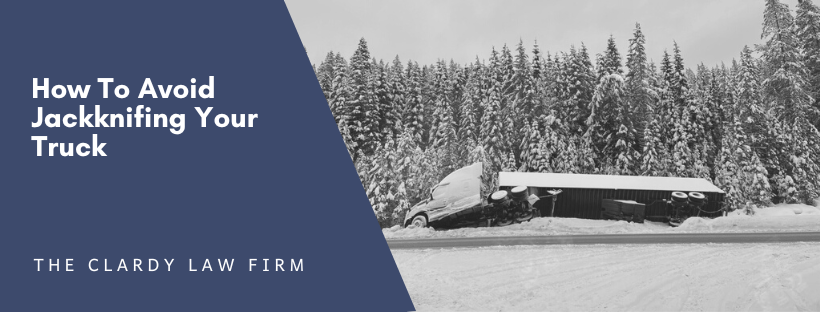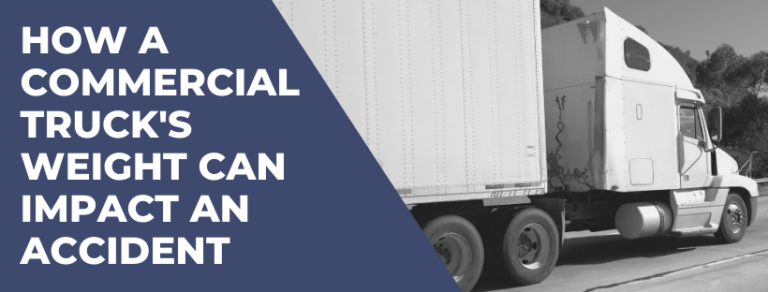Every so often on the news, you will hear about a truck accident where a tractor-trailer jackknifed on the highway, sometimes with fatal consequences. Even if you’re the most experienced truck driver, you can end up jackknifing in the wrong conditions, leaving you in serious danger and making your truck a dangerous weapon. Knowing how jackknifing occurs and how to avoid it can save your life and so many others along the way.
What Is Jackknifing and How Does It Happen?
Jackknifing occurs when a vehicle and its attached trailer get out of sync during towing, forming an L or a V shape. The phrase originates from the shape the truck and accompanying trailer create, which looks like a jackknife as its blades fold into the handle.
The vehicle’s tires lose traction during such an instance, with the wheels skidding instead of rolling, leading the trailer to swing sideways violently. The tires can lose traction due to poor road conditions caused by weather or due to improper braking. Once a jackknifing begins, it causes you to lose control and put several motorists within range at risk.
Often, jackknifing is preventable once certain measures are employed to improve safety and control.
How Do You Prevent Jackknifing?
Preventing jackknifing primarily comes down to being a smarter and safer driver. Before hitting the road, drivers should meticulously examine every aspect of the truck and trailer. So always check tire pressure and conditions, ensure proper hitch connection, and inspect the brake system for any signs of wear or malfunction. You should strictly follow maintenance schedules to address issues promptly and keep the entire towing system in optimal condition.
1. Check Your Mirrors
You first need to check your mirrors to ensure your trailer isn’t swinging wildly or making any sideways motions. Check your mirrors as you apply the brakes to gauge the level of attentiveness required when maneuvering with a trailer in tow. Make sure you brake slowly and gradually before a bend in the road. If you notice your tractor is jackknifing, let the brake go so the wheels resume rolling and regain traction. If it’s a trailer jackknife, you can increase your speed so the trailer falls back into place.
2. Light Loads Cause Heavy Burdens
In many cases, jackknifing happens because the trailer is empty or has a light load. The heavier a trailer is, the less likely it is to jackknife. A heavier load allows the trailer to bear down on the road, improving grip. A light or non-existent load works against a tractor, causing friction issues.
Lighter loads pose a unique challenge when it comes to braking. The braking systems of tractor-trailers are optimized for fully loaded conditions. When the trailer is empty or lightly loaded, over-braking becomes more likely, as the braking force may exceed what is necessary for the reduced weight. This imbalance can lead to the trailer skidding or swinging out of alignment, especially if not addressed promptly.
Strategies for Light Load Situations:
- Increase following distance: Give yourself extra space behind other vehicles with a light load. This allows for a more gradual response to changes in traffic flow and helps prevent sudden and harsh braking.
- Adjust speed accordingly: Lowering your speed, especially when approaching turns or bends in the road, can counteract the effects of a light load. This measured approach minimizes the risk of the trailer losing traction or swinging unexpectedly.
Related: How A Commercial Truck’s Weight Can Impact An Accident
3. Brake Properly: Navigating Turns and Hills Safely
Braking correctly is a major element in ensuring your tractor-trailer doesn’t jackknife. So many jackknifing accidents are caused because the tractor-trailer driver was either braking too quickly or with too much force while trying to get things under control.
Especially when roads are slick or frozen during wintertime, you’ll need to brake carefully when operating a tractor-trailer.
Here are additional insights and strategies to master the art of braking and enhance your ability to navigate turns and hills with confidence:
- Progressive braking on approaching turns: Avoid slamming on the brakes when approaching a turn. Decelerate slowly on the long stretch preceding the bend or curve. That helps your tires maintain traction and allows you to speed up a bit once you’re done negotiating the curve.
- Caution on downhill turns: Downhill turns are often prime candidates for jackknifing. Whenever you proceed down a steep hill and want to turn to either side, don’t assume the trailer will follow you. You need to slow it down or come to a complete stop before heading left or right. Because it’s a hill, the trailer will continue straight down the slope due to its gravity level. Once you’ve checked your trailer’s momentum and are satisfied, you can pull it around the corner.
- Anti-lock braking system (ABS) utilization: If your tractor-trailer is equipped with an Anti-Lock Braking System (ABS), leverage this technology to your advantage. ABS helps prevent wheel lockup during hard braking, allowing for continued steering control. Familiarize yourself with the operation of ABS and trust it to optimize braking performance, especially in slippery conditions.
- Gentle braking to avoid locking: Avoid hitting the brakes too heavily, as this could cause them to lock, which means you’ll lose control and accelerate the jackknifing.
- Safe following distance: Maintain a safe following distance from other vehicles on the road. A considerable gap provides the space needed to respond to changing traffic conditions without abrupt braking. Avoid situations where you feel compelled to brake hard due to the proximity of other vehicles, allowing for a more controlled and predictable driving experience.
- Emergency maneuvers with poise: If you are in an emergency situation, avoid braking and swerving simultaneously, as this can complicate things further. You may have to brake first, let the brake go, then swerve, and brake again. You’ll need a strong hand and poise to maneuver this situation.
- Winter driving precautions: When roads are slick or frozen during wintertime, heightened vigilance is crucial. Adjust your driving to the prevailing conditions, allowing for increased stopping distances and adopting a conservative speed. Utilize winter tires for enhanced traction, and be particularly mindful of the potential for black ice, which can further compromise braking effectiveness.
Anti-Jackknifing Technology
In addition to driving techniques, there’s more technology than ever to help prevent jackknifing.
Anti-Lock Brakes (ABS)
As improper braking leads to many jackknifing incidents, anti-lock brakes are available for your tractor, trailer, or both. These brakes prevent your wheels from locking up, equipping your vehicle with sensors that look out for unusually heavy braking. Whenever you’re over-braking by slamming on your brakes too much, the sensors kick in, decreasing the brake pressure on the wheel. They help you to steer with more firmness and avoid skidding. They aren’t much different than normal brakes in cars, but they are essential for maintaining steadiness in big rigs.
Load-Sensing Regulators
Load-sensing regulators are another technological innovation aimed at optimizing braking performance. These regulators automatically adjust brake pressure based on the weight of the load being transported. When the load is light, the system reduces brake pressure on the wheel, preventing unnecessary wheel lockup. This enhances overall braking efficiency and contributes to stability during various driving conditions. Load-sensing regulators are particularly beneficial in situations where the cargo weight fluctuates, providing a dynamic response to changing load conditions.
Coupling Devices and Fifth Wheels
Coupling devices, especially the fifth wheel, prevent excessive folding between the tractor and trailer. The fifth wheel is a pivoting mechanism that allows the trailer to articulate with the tractor while maintaining a secure connection. This technology minimizes the risk of the tractor and trailer folding too far into each other, which could lead to jackknifing. When properly calibrated and maintained, the fifth wheel enhances the overall stability of the towing system.
Swing-Limiting Devices
To complement the fifth wheel, the use of swing-limiting devices is advised. These devices are designed to restrict the range of movement between the tractor and trailer, preventing excessive sway or folding during turns. Drivers can engage or disengage these devices as needed, providing an added layer of control over the articulation between the tractor and trailer. When combined with a fifth wheel, swing-limiting devices contribute to a safer and more controlled towing experience.
Electronic Stability Control (ESC)
Electronic Stability Control is an advanced safety technology that goes beyond braking systems. ESC uses sensors to monitor various parameters, including steering input, vehicle speed, and yaw rate. When the system detects a potential loss of control, it intervenes by selectively applying brakes to individual wheels and, in some cases, adjusting engine power.
ESC effectively prevents skidding and jackknifing, especially during emergency maneuvers or challenging road conditions.
Telematics and Predictive Analytics
Telematics systems integrated with predictive analytics provide real-time data on various aspects of vehicle performance. These systems can analyze driving patterns, brake usage, and other relevant metrics to identify potential risks. By offering insights into driver behavior and vehicle dynamics, telematics enables proactive measures to prevent jackknifing incidents, contributing to an overall safety culture within trucking operations.
With such technology and safer driving tips, you can keep your tractor-trailer from jackknifing and putting lives at risk. Always check your tires to make sure they are in good working order and appropriate for the season. Inspect your brakes and steering wheel, and make sure your tractor-trailer is as well-balanced as possible before heading onto the road.
Related: What to Do after a Truck Accident in South Carolina
Been in a Jackknifing Accident? The Importance of Consulting a Truck Accident Lawyer
In the aftermath of a jackknife accident involving a commercial truck, seeking legal counsel is paramount for several reasons:
- Legal knowledge: Truck accident lawyers understand intricate trucking regulations, aiding in identifying liability factors.
- Determining fault: Experienced attorneys can assess evidence, including accident reports and opinions, to establish negligence and fault.
- Preservation of evidence: Swift action to secure crucial evidence, such as black box data and witness statements, is essential for a thorough investigation.
- Negotiating with insurers: Truck accident lawyers like ours are skilled in negotiating with insurance companies to ensure fair compensation for medical expenses, property damage, and other losses.
- Pursuing maximum compensation: Calculating the full extent of damages, attorneys aim to secure the maximum compensation for medical costs, lost income, and pain and suffering.
- Advocacy in court: If necessary, lawyers can advocate in court, leveraging their knowledge to present a compelling case before a judge and jury.
- Providing peace of mind: By handling legal complexities, attorneys offer peace of mind, allowing clients to focus on recovery and emotional well-being.
In summary, consulting a truck accident lawyer is essential for navigating the legal aftermath of a jackknife accident, ensuring your rights are protected, and pursuing the compensation you deserve.





